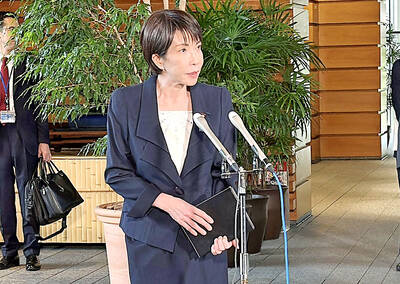British energy giant BP and China’s CNPC International Ltd were unveiled yesterday as the first foreign firms in decades to win contracts to invest in and develop Iraq’s war-battered energy sector.
The companies succeeded in their bid for the giant Rumaila oil field in southern Iraq, which has known reserves of 17.7 billion barrels, the oil ministry announced.
The contract was the first to be awarded in open tendering for six major oil fields and two gas fields, nearly four decades after former Iraqi president Saddam Hussein’s party nationalized the Iraqi energy sector.

PHOTO: REUTERS
The deals will provide the government with much-needed revenue as it struggles to rebuild the country after three wars and more than a decade of debilitating economic sanctions.
“These contracts are needed for the reconstruction of Iraq,” Prime Minister Nouri al-Maliki said at the opening of the bidding session in Baghdad. “They are for the benefit of Iraqis and the companies.”
The bidding process has attracted bids from 31 firms including US and European giants ExxonMobil and Shell, but also a swathe of Asian companies from China, India, South Korea and Indonesia.
The oil deposits, holding known reserves of 43 billion barrels of crude, are in southern and northern Iraq, while the gas concessions are west and northeast of Baghdad.
“Our principal objective is to increase our oil production from 2.4 million barrels per day to more than 4 million in the next five years,” Oil Minister Hussein al-Shahristani said in an interview with Iraqi public TV.
Increasing production to that level will, he said, pump an extra US$1.7 trillion into government coffers over the next 20 years.
Shahristani has said that only US$30 billion of that sum will go to the companies that have extracted the oil.
The rest “is a huge amount that would finance infrastructure projects across Iraq — schools, roads, airports, housing, hospitals,” he said, insisting that the country would retain control over its oil reserves.
For energy firms, the appeal is the opportunity to plant a foot in the country, their first chance to do so since the Baath party nationalized the Iraq Petroleum Company in 1972, seven years before Saddam took power.
“Thanks to sanctions and war, no company has wanted or been able to invest,” said Ruba Husari, an energy expert and the founder of the Web site iraqoilforum.com. “Today, the country is stable, in both its security and its institutions.”
Not all energy firms are happy, though, with the terms of the contracts being offered by Baghdad.
The foreign firms awarded deals will have to partner with Iraqi government-owned firms, principally the South Oil Company (SOC), and share management of the fields despite fully financing their development.
They will be paid a fixed fee per barrel, not a share of the profits.
“This raises the question of the profitability of the contract,” said a source involved in the bidding, who spoke anonymously. “The companies are the ones investing, but have a big problem with the fact that management will be shared.”

‘MOTHER’ OF THAILAND: In her glamorous heyday in the 1960s, former Thai queen Sirikit mingled with US presidents and superstars such as Elvis Presley The year-long funeral ceremony of former Thai queen Sirikit started yesterday, with grieving royalists set to salute the procession bringing her body to lie in state at Bangkok’s Grand Palace. Members of the royal family are venerated in Thailand, treated by many as semi-divine figures, and lavished with glowing media coverage and gold-adorned portraits hanging in public spaces and private homes nationwide. Sirikit, the mother of Thai King Vajiralongkorn and widow of the nation’s longest-reigning monarch, died late on Friday at the age of 93. Black-and-white tributes to the royal matriarch are being beamed onto towering digital advertizing billboards, on

Indonesia was to sign an agreement to repatriate two British nationals, including a grandmother languishing on death row for drug-related crimes, an Indonesian government source said yesterday. “The practical arrangement will be signed today. The transfer will be done immediately after the technical side of the transfer is agreed,” the source said, identifying Lindsay Sandiford and 35-year-old Shahab Shahabadi as the people being transferred. Sandiford, a grandmother, was sentenced to death on the island of Bali in 2013 after she was convicted of trafficking drugs. Customs officers found cocaine worth an estimated US$2.14 million hidden in a false bottom in Sandiford’s suitcase when

POWER ABUSE WORRY: Some people warned that the broad language of the treaty could lead to overreach by authorities and enable the repression of government critics Countries signed their first UN treaty targeting cybercrime in Hanoi yesterday, despite opposition from an unlikely band of tech companies and rights groups warning of expanded state surveillance. The new global legal framework aims to bolster international cooperation to fight digital crimes, from child pornography to transnational cyberscams and money laundering. More than 60 countries signed the declaration, which means it would go into force once ratified by those states. UN Secretary-General Antonio Guterres described the signing as an “important milestone,” and that it was “only the beginning.” “Every day, sophisticated scams destroy families, steal migrants and drain billions of dollars from our economy...

PRESSURE: Trump is expected to demand that Tokyo raise its defense spending, but Japan’s new foreign minister said the amount is less important than how it is spent Japan plans to show its determination to further build up its defense to rapidly adapt to changing warfare realities and growing tension in the region when US President Donald Trump visits Tokyo next week, Minister of Foreign Affairs Toshimitsu Motegi said. Japanese Prime Minister Sanae Takaichi’s administration is also finalizing a purchase package, including US pickups, soybeans and gas, to present to Trump, but would not commit to any new defense spending target at the meeting, a source with knowledge of the preparations said. The two leaders are to sit down in Tokyo on Monday and Tuesday next week during Trump’s first